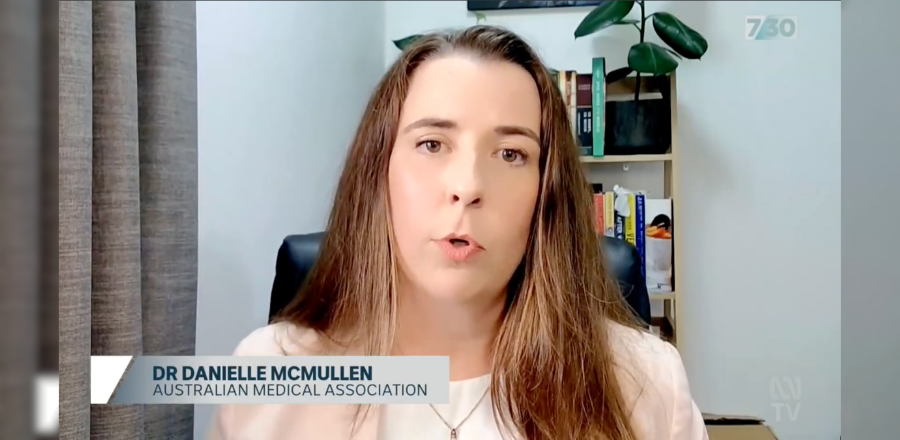AMA Transcript - AMA Vice President on ABC 7.30 Report
Transcript: AMA Vice President, Dr Danielle McMullen, spoke with ABC’s 7.30 Report, Tuesday 4 April 2023. Below is a full transcript of the interview.
Subject: AMA responding to release of independent report on Medicare compliance

REPORTER: Why is it so important to have a well-functioning health system for people?
DANIELLE MCMULLEN: For decades now, Australians have trusted that they have a well-funded and well-resourced Medicare system so that they can get urgent and primary medical care when they need it most. We've got an excellent healthcare system in Australia, which means Australians do have that trust that they can get healthcare when they need it most. But we need to protect that system and make sure that it's fit for purpose, particularly with changing patterns of disease, more chronic and complex illness, and newer models of care, so that really we can continue to provide that high level of care into the future.
REPORTER: We’ve now seen Pradeep Philips report into the system. What was the AMA's initial reaction to these findings?
DANIELLE MCMULLEN: This report said the same thing that the AMA has been saying from the start, that the overwhelming majority of doctors across Australia are doing the right thing, the right thing by their patients in providing high quality care, and the right thing by the system in taking our role as stewards of those precious Medicare dollars seriously. And in fact, we've seen studies from the University of Sydney this week showing that doctors are likely to under bill Medicare for fear of compliance and in that role to protect the system to the tune of about $350 million a year. So we know that that altruism is really what's keeping the system going.
REPORTER: The report, though, did find that on a conservative definition that non-compliance and fraud could be losing up to $3 billion a year. That's a lot of money.
DANIELLE MCMULLEN: So, if you read the report, it shows, what it does say is that there's the potential for fraud, that our Medicare system and the billing systems behind it aren't keeping pace with providing modern medical care and that there are gaps in the system. And the AMA fully agrees that there are gaps and the potential for fraud in the system. But what the report also says is that despite those gaps, the rates of intentional fraud are very low and that the vast majority of leakage from the system is actually due to that complexity of Medicare and the difficulties of matching best practice medical care with a complex MBS with over 6000 items. So as a doctor, when we're trying to provide care to patients, we're trying to do what's right for you as a patient. And then we've got to map that against 6000 different descriptors and try and work out which is the most appropriate to what we've done. Sometimes that's like fitting a square peg in a round hole and it really can be quite difficult to make that match up. Those are the issues that were highlighted in the Philip Report and the need to modernise Medicare systems, make sure that it's fit for purpose going forward, that we do strengthen compliance activities to make them more seamless and fit with workflow so that patients and doctors can continue to have trust in the system.
REPORTER: Does it matter if it's intentional or non-intentional, non-compliance, if we're talking about billions of dollars?
DANIELLE MCMULLEN: So what the report shows is that Medicare is a complex system, and we do need to simplify that so that we can get the best possible value out of our Medicare dollars. Patients expect that the tax they're paying goes directly to patient care. And that's why the AMA has been working with groups like the Strengthening Medicare Task Force, which includes recommendations around better communication, better IT support, so that we do see less duplication and more seamless journeys through the health care system, which will save the system money and make sure that we're providing the most modern, accessible, affordable care.
REPORTER: Just wanted to go to some of those recommendations. Obviously, there are recommendations around strengthening oversight, modernising the payment systems, and reviewing the enabling legislation regulation. Do you think that will be enough to reform the system as much as it needs to?
DANIELLE MCMULLEN: The AMA is planning to take a close look at the detail of the many recommendations in this report and discuss those with the Minister and work with government to make sure that we do what we can to strengthen Medicare and make sure that it's fit for purpose going forward. These changes to compliance governance are likely to need to go hand in hand with the work of groups like the Strengthening Medicare Task Force, and like the work we saw with the MBS review, to make sure that we can provide that complex care to patients with chronic disease, mental illness, and multiple illnesses really needing care from their GP and other doctors.
REPORTER: How much damage do you think this whole debate has done to the medical profession and to the integrity and trust, I suppose, that patients have for the doctors in the medical profession?
DANIELLE MCMULLEN: The unfounded claims of $8 billion of fraud gave the medical profession a huge blow. They felt like they'd been hit by a bus. But this report vindicates their hard work and shows that the overwhelming majority of doctors are doing the right thing and that our Medicare system is held together by the altruism and goodwill of the medical professionals working in it. So, patients across Australia can have trust that their doctors are doing the right thing by them and by the system. But that's not to say that we don't need to make sure that we're fit for purpose going forward, particularly with more chronic disease in our community.
REPORTER: Again, whether it's $8 billion or the up to $3 billion that Dr Philip mentioned, he was very adamant that we shouldn't be focusing on the number. I mean, do you agree? Do you concede that there is a problem with the way that Medicare is being administered at the moment?
DANIELLE MCMULLEN: The AMA has said for many years, and you can go back and see multiple submissions on our website, that … Medicare does need reform and does need improvement. Right back to the MBS reviews, we've complained about the complexity of Medicare and the opaqueness of some of the compliance that's in place. And we have worked constructively with governments over that time to improve Medicare, to streamline items, and to make sure that compliance is more real time, and that doctors and patients both understand how those compliance activities work. There's, of course, more to be done, but we're certainly keen to work with government and make sure that Medicare can be as simplified as possible whilst still providing that high quality, accessible care to patients.
REPORTER: The Sydney University report that you mentioned, it did have an interesting figure in it that said that, I think it was 29.6 per cent of doctors had overbilled at least once. That seems to align with what Dr Philip earlier found around that one third number of non-compliance. Were you surprised by that?
DANIELLE MCMULLEN: So, what that University of Sydney report showed overwhelmingly is that doctors do under bill more often than overbilling the system. There is a fear of compliance activity and also a sense of responsibility for Medicare spending that leads doctors to under bill for services that are provided. What that report and the Pradeep Philip report both show is that in an environment where we're seeing constrained funding across government, and particularly in health, along with this fear of compliance is that actually we're at risk of patients missing out on vital healthcare services because doctors are scared of billing Medicare and are not getting appropriately remunerated for work done, and patients are getting inadequate rebates for the care they receive. So, if anything, these reports show a risk of underservicing patients across Australia.
REPORTER: Are you concerned, though, about that 29 per cent who admitted to overbilling?
DANIELLE MCMULLEN: As the Pradeep Philip report shows, the vast majority of billing errors are due to complexity in the system. So, there are times when it is really difficult to know which item is most appropriate to bill, and the supports provided to doctors and other healthcare practitioners trying to provide those accurate billing is really difficult to access at the moment. So, there is a lot of work that needs to be done to make sure that doctors and other providers know exactly which item is most appropriate to bill. And we're supportive of those calls for streamlining of item numbers, improvements in education and communication to make sure that everyone's on the same page as to what the most appropriate use of Medicare is.
REPORTER: The other recommendations that Dr Philip made was that the AMA be stripped of its veto approval power on the appointment of the Professional Services Review scheme. I was just wondering what the AMA's response to that is.
DANIELLE MCMULLEN: There is that recommendation to remove that right, but there's very little detail around why that recommendation was made, and we're certainly going to be discussing that further with the Minister. The AMA was instrumental in the development of the PSR, which takes care of the most serious cases of fraud and abnormal billing in the system. It shows that we feel strongly that compliance is important in a system like Medicare, and we're keen to remain involved in the selections to make sure that the profession has trust in that system. We heard throughout the Pradeep Philip report that there is fear of compliance from providers and we're keen to work with government to see how they plan to reduce that fear and also strengthen the compliance measures that are in place.
REPORTER: So will the AMA be fighting to keep that veto power?
DANIELLE MCMULLEN: The AMA will be discussing that recommendation further with the Minister to make sure that we're doing everything we can to ensure that the profession continues to have trust in the regulator, and is working together to improve the situation of Medicare and making sure that the funding is going directly to patient care.
REPORTER: From the outside, from a consumer perspective, it might seem strange that a profession would basically be policing itself. Should patients be concerned if the AMA continues and keeps that veto power?
DANIELLE MCMULLEN: So actually, in regulatory systems it's important that the profession has trust in the regulator and that there are clear guidelines about how compliance activities are run, that that educational material, if you read the report, there's a significant focus on the need to improve education, real time compliance. And there were actually no significant problems raised with PSR, and so we do have some questions for the Minister as to what issues they see in that pointy end of the process. But really most of our focus is going to be on building that education, streamlining the system and making sure that doctors and patients have a clearer understanding about how Medicare works and the compliance frameworks around it.
REPORTER: Isn't it more important that patients have trust in the system than the profession has trust in the regulator?
DANIELLE MCMULLEN: So, we know that doctors and medical professionals are amongst the most trusted professionals in our society, and it is hugely important that patients continue to have trust in the high quality medical care that they receive in this country. And I think this report certainly shows that; it in fact spells out that the altruism of medical professionals is responsible for the success of our healthcare system. So, patients can have trust that the doctors and other health professionals working with Medicare really have their best intentions at heart. And we do need to work on some of the governance to make sure that the risks that are seen in the system are tidied up for future proofing, but that despite those risks being in the system, that actually this report found that the vast majority of activity is done in good faith and actually is protecting our healthcare system.
REPORTER: One thing that Dr Philip said was that he was surprised in his review process about the lack of mention of the patient experience and the health and wellbeing of patients. Have patients been forgotten in this entire debate?
DANIELLE MCMULLEN: Patients have certainly not been forgotten. I know we referenced patient care throughout our discussions with Pradeep Philip on this report, because patient care is of course at the centre of everything we do as doctors. Through this report, but also in strengthening Medicare task force and the other work that we're undertaking with government at the moment, patient care is at the centre of that, and our overwhelming goal is to build a healthcare system that is fit for the future. We know that patients are experiencing more chronic disease, mental illness, complex illness. We need patients to have more time with their doctors, more support of an integrated care team. And we know that patients are sick of telling their story over and over to disconnected healthcare professionals, and so we are working with government to connect our system better and make sure that the patient experience is smoother when they're trying to seek healthcare.



